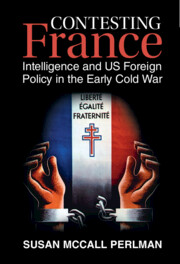Book contents
Conclusion
How Intelligence Becomes Policy
Published online by Cambridge University Press: 02 February 2023
Summary
The conclusion argues that U.S. analysis on France reveals the complex relationship between intelligence and the formulation of American foreign policy in the early Cold War. It contends that a transnational and at times transimperial web of French factions and informants was largely responsible for shaping these views through their frequent informal and formal exchanges with American diplomats and intelligence officials, and they did so with their own political agendas and interests in mind. Through their U.S. contacts, they directly contested images of France, demonstrated legitimacy and outmaneuvered rivals, and played a fundamental role in shaping American perceptions and policy. This chapter also shows that the narrative of French weakness and communist intrigue began to unravel under the scrutiny of analysts who understood its provenance and questioned its basis. In fact, there were a myriad of other explanations for seemingly nefarious communist activity in France, ones for which emotionally driven and depleted observers failed to account.
Keywords
- Type
- Chapter
- Information
- Contesting FranceIntelligence and US Foreign Policy in the Early Cold War, pp. 192 - 204Publisher: Cambridge University PressPrint publication year: 2023



